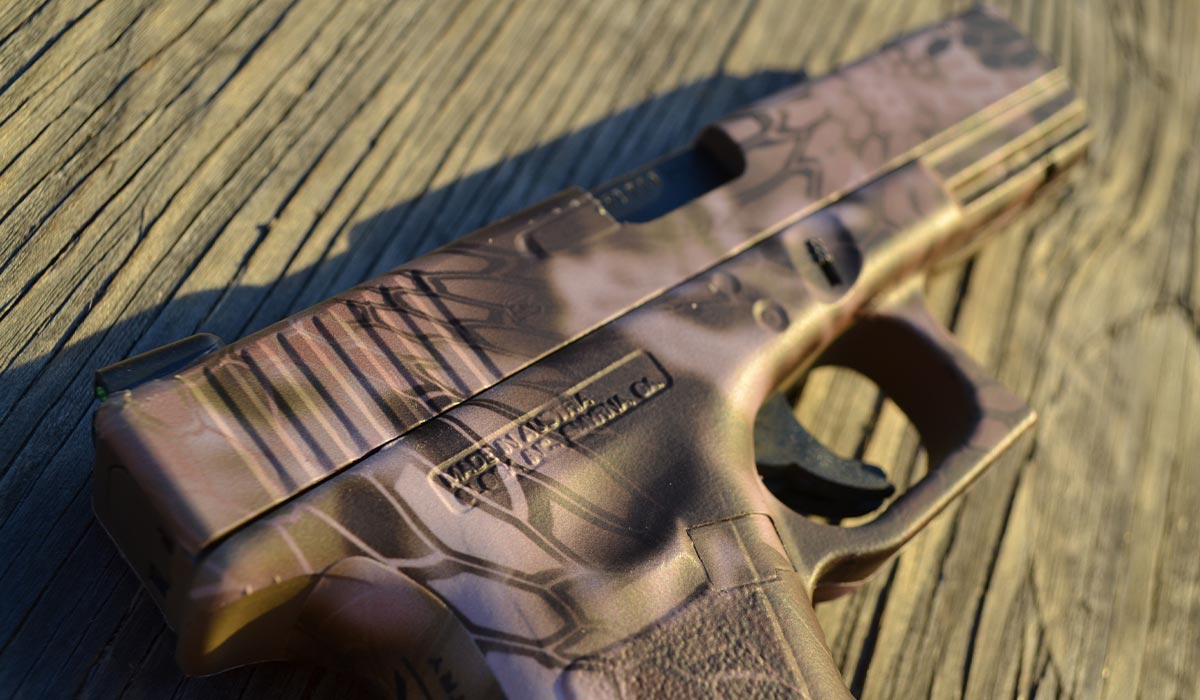How to Personalize Your Gun: Hydro Dipping vs Cerakote vs GunSkins

When it comes to camouflaging or personalizing your firearm, whether it is a pistol, shotgun, or rifle, there are several different options. Can you spot the difference? There is Hydro Dipping, which is a water-soluble film-based process. Another well-known option is Cerakote, a permanent layer of ceramic composite applied to the surface of your gun. And there is GunSkins, a high-performance, do-it-yourself vinyl wrap.
It is essential to weigh the pros and cons of each method when considering camouflaging or personalizing your gun. Below is a table of essential factors to consider when deciding which process to follow.
Compare and Contrast
| Hydro Dipping | Cerakote | GunSkins | |
| Cost: | $100 - $400 | $100 - $400 | $15 - $65 |
| Application Surfaces: | Wood, plastic, metal, glass, composite... As long as the object is submersible. | Wood, steel, plastic, polymer, composite. | Wood, plastic, metal, glass, composite. |
| Installation: | Requires specific equipment, chemicals, and approximately 8 hrs. | A certified applicator. Requires specific equipment and chemicals and days for shipping and labor. | At home DIY installation. Approximately 30-mins to 2 hours. |
| Permanent/Removable: | Permanent. It can be removed using professional bead blasting. | Permanent. It can be removed using professional bead blasting. | Removable. Has no effect on the surface or function of the weapon. |
| Finish: | Durable matte clear coat. | Durable ceramic composite coat. | Durable matte laminate. |
| Longevity: | 10+ Years. | 10+ Years. | 5+ Years. |
Hydro Dipping
Hydro Dipping is a method of applying a pattern to three-dimensional and submersible surfaces, not just onto guns. Hydro Dipping also has a few names that are interchangeable. Those names are Hydro Graphics, Water Transfer Printing, or Immersion Printing. As you can see from the different names of this method, water is involved.
Hydro Graphics is a relatively costly and complex process that is quite permanent unless a professional is able to take it off. With little room for error, the right tools and chemicals on-hand, and a large learning curve, this practice is best left to the professionals. With that in mind, you’ll likely need to bring or ship your firearm through an FFL to a certified professional. This process offers image-defining styling options that leave your surface in a decorative coating that is attractive, easy to clean, and stain resistant.
If you decide to go through with this process and do it yourself, here are steps to follow to ensure your gun is evenly coated and every crevice gets covered:
- Clean your gun and make sure the surface is even with no dust or debris.
- Then, spray a base coat/primer to your gun, but do not spray too much to where it runs. Spray 1-2 times and leave to dry.
- Cut the film to the size and shape of your gun. Then, the camouflage pattern is laid on the surface of the large tub of water which will float and should be left for the film to hydrate.
- After about a minute or so, apply the activator by spraying it evenly over the film.
- Next, dip your gun at a 45-degree angle and let the entire gun submerge in the water. Remove the gun from the water and rinse immediately with cold water for 3 minutes to remove any residue.
- Finally, after you dry the item, apply the top coat and spray your gun with this aerosol coat spray 1-2 times, or to your liking.
Cerakote Firearm Coating
Cerakote is a specialized coating that can be applied to a variety of surfaces including wood, polymers, metals, and plastics. Cerakote finish can often be mistaken for paint, but in reality, it is very different. Cerakote benefits your firearm by enhancing the physical components, while also protecting your gun in the long run from daily wear and tear. As previously mentioned, the Cerakote finish can be applied to various surfaces. A variant of Cerakote called H-Series is recommended for firearms or other weapons like knives. This specific variation requires heat to cure the finish but this will add the highest level of abrasion, corrosion, and chemical resistance.
Cerakote applications should only be done by professionals who have the training, experience, and proper equipment. Most customers who decide cerakote is the best course of action for them will have to send off their gun, through an FFL, to have the work done. There are many companies with licensed dealers that are able to do this practice. It’s both tough and durable, but hardly a necessity if you just want to add some looks to your pistol or rifle. Cerakote is a permanent application that cannot be undone very easily but will last a very long time and will protect your gun.
GunSkins Vinyl Wrap
American-made GunSkins kits are made from a conformed high-performance vinyl material. GunSkins are 100% waterproof, non-reflective, and very durable. We’re often asked about how GunSkins stand-up to the high temperatures of a muzzle. GunSkins are rated up to 230 degrees, and have been heavily tested in all kinds of conditions. What that means, in short, is that wrapping a semi-automatic rifle, shotgun or pistol is no problem whatsoever from a heat perspective, but we don’t recommend wrapping the barrel of a tactical rifle like an AR-15, AK-47, etc. (handguards are fine) nor a suppressor. Also, unlike Hydro Dipping and Cerakote, GunSkins are removable!
GunSkins kits span more than 75 patterns, and include pre-cut pieces designed to fit any gun. Apply Gunskins to the surface of your firearm with heat (heat gun or hair dryers work great). Although they are removable if you’re ready for a new look to your gun, you can expect to get about 5 years out of a well-done installation.
GunSkins can be applied at home with few tools and no harmful chemicals, do not affect the operation of your gun, and provide a durable layer of protection from water and dirt that gives the gun an attractive look. Since GunSkins is a DIY application, there is room for error while applying the wrap to your gun. The vinyl can be removed, adjusted, and reapplied to address any wrinkles, air bubbles, etc. The material is very easy to work with and forgiving. With the right use of heat, the vinyl wrap can conform to any shape and will look as good as any other finish like Cerakote or Hydro Dipping.
GunSkins offers kits with pre-cut pieces to fit many of the most popular guns – popular rifles, shotguns, pistols, and AR-15 rifles – while also offering patterned vinyl sheets of different sizes for other guns and gear. If there is excess material, it's easy to trim away the pieces using a #11 hobby knife.
It All Comes Down To Personal Preference
When it comes down to it, deciding between your options is all up to personal preference. We’ve had many customers who could not tell the difference between a Gunskins wrapped gun, a Cerakote gun, and a Hydro Dipped gun. Hydro Dipping, Cerakote, and GunSkins all achieve a very similar result by adding protection to your gun, while also adding a new color scheme or pattern. The main questions to consider when choosing one method over the others are: what is your budget, do you want this color/pattern forever, do you want to do it yourself? You can’t go wrong and your gun will come out looking new, fresh, and attractive!
We've worked hard to continue to improve the GunSkins product, and we're hearing from others that it is competitive with Cerakote and Hydro dipping. Thanks to Spear Tactical Reviews for their comparison work: “More durable than cerakoting and hydro dipping, it’s a great way to protect the surface it also allows you to change the look up as often as you would like for about half the cost.”












4 comments
Great article. I absolutely love GunSkins, and have them on most of my firearms. One part of the article confused me. Where you list the types of surfaces that each method can be applied on, you did not list polymer as a surface for GunSkins. I have 3 M&P 15-22’s, which all have a polymer upper and lower, and I have MagWell Skins on all of them. They work great. I also have MagSkins on all of my Magpul magazines, another polymer surface, and there are no problems with them. Is there a reason that you don’t list polymer as a compatible surface?
Great article. I absolutely love GunSkins, and have them on most of my firearms. One part of the article confused me. Where you list the types of surfaces that each method can be applied on, you did not list polymer as a surface for GunSkins. I have 3 M&P 15-22’s, which all have a polymer upper and lower, and I have MagWell Skins on all of them. They work great. I also have MagSkins on all of my Magpul magazines, another polymer surface, and there are no problems with them. Is there a reason that you don’t list polymer as a compatible surface?
We appreciate the interest, Rich. We’re targeting a release window of early 2023.